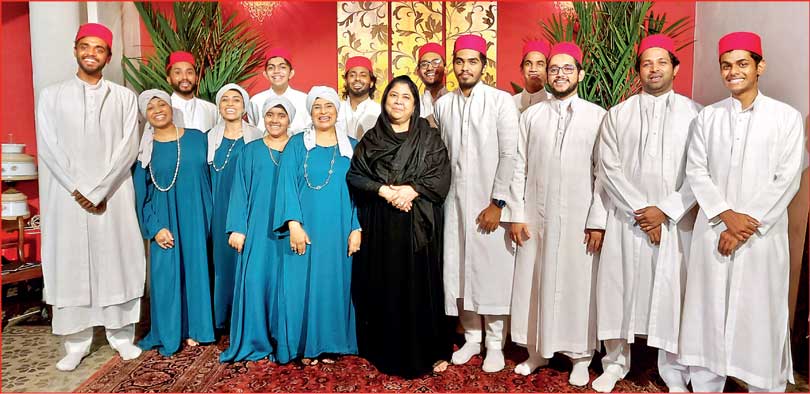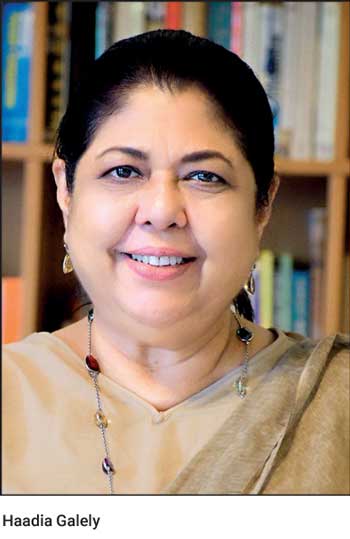Tuesday Feb 17, 2026
Tuesday Feb 17, 2026
Saturday, 1 June 2024 02:00 - - {{hitsCtrl.values.hits}}

 An’nur; the performance of the Muslim Choral Ensemble (MCE) will commence tomorrow, 2 June at the Lionel Wendt Theatre at 7 p.m. The MCE was founded in 2017 by Sri Lankan cultural humanist Haadia Galely, in collaboration with Artistic Director André de Quadros and Associate Artistic Director Manoj Sanjeewa. The Harmony page is pleased to feature this significant annual contribution to Sri Lankan arts and culture once again, in 2024, and publish below excerpts of the interview with Haadia Galely.
An’nur; the performance of the Muslim Choral Ensemble (MCE) will commence tomorrow, 2 June at the Lionel Wendt Theatre at 7 p.m. The MCE was founded in 2017 by Sri Lankan cultural humanist Haadia Galely, in collaboration with Artistic Director André de Quadros and Associate Artistic Director Manoj Sanjeewa. The Harmony page is pleased to feature this significant annual contribution to Sri Lankan arts and culture once again, in 2024, and publish below excerpts of the interview with Haadia Galely.
Q:You have been for almost two decades organising music related events and festivals in Sri Lanka. What is your background in music?
A: I studied and played Sitar initially with the intention of pursuing a career in music. After marriage I decided that I would start organising and creating music related events especially for better socio-cultural understanding. With the unstinted support of my family I have been committed to this task. I launched the Muslim Choral Ensemble in 2017.
Q: How did you get around to starting the Muslim Choral Ensemble (MCE)?
A: Considering the need to create a platform for Muslims who had no opportunity to perfect their singing talents, I was inspired to establish an Islamic Spiritual Ensemble. My dream was to offer a space for those passionate about music and eager to understand the culture and heritage of Muslims or embrace Islamic spiritual traditions as “soul-satisfying” to their religious beliefs. This initiative goes beyond entertainment, aiming to provide a deeper, meaningful experience. This vision and purpose led to the launch of the Muslim Cultural Ensemble (MCE), now recognised for its unique journey.
Q: What was your childhood connection to music?
A: I grew up in a family with an eclectic taste in music and the arts. Although they did not necessarily play musical instruments, their deep appreciation for music and the arts profoundly influenced me. My home was always filled with a diverse range of musical genres, from classical to contemporary, which sparked my curiosity and love for music. This rich musical environment inspired me to pursue formal training in playing the sitar. The sitar’s intricate melodies and spiritual resonance captivated me, fostering a lifelong connection to the performing arts. This passion for music has continued to enrich my life, guiding my artistic journey and shaping my understanding of cultural expression that has now paved the way to establish culture diplomacy through our work.
Q:There are different theories on music and Islam. How does one come to a logical balance?
A: Understanding the reasoning behind these theories is crucial. Such discussions are present in many religions, not just Islam, which is often overlooked. Although I am not a theologian and cannot delve into the theological intricacies, my love and respect for Islam and its various denominations have helped me find balance. Respecting different schools of thought and opinions is the key to life. Life is about balance and respect. Embracing these values have allowed me to gain support despite the challenges, often due to a lack of knowledge and awareness. Our work goes beyond entertainment, fostering a deeper connection and understanding of our cultural and religious traditions.
Q:Tell us about the singers and conductors of MCE?
A: We have a diverse group of male and female members from various denominations within our Muslim communities. They all share a passion for using their vocal talent as well as to be able to convey their spiritual devotion as is felt during the recitation of the Holy Quran. Many of them lacked the opportunity to further develop their singing abilities. They now have a platform that MCE has provided them with. Manoj is our Associate Artistic Director and is now being assisted by Murthaaz Barry, a member of our ensemble, and Prof. André de Quadros an internationally acclaimed Artistic Director who is a Professor of music at Boston University. We strive to accept and appreciate differences without bias, and this diversity enriches our performances, reflecting the inclusive spirit of the MCE. We work as a dynamic team to realise our ongoing commitment to our cultural and spiritual expressions.
Q: How is the MCE performance this year different from last year?
A: While we must stay true to our essence as a spiritual ensemble, we continually strive to faithfully represent the various Islamic traditions, highlighting the traditional music heritage and practices, showcasing overall the rich aesthetic diversity of Islamic culture. As the first ensembles in South Asia and beyond, we proudly celebrate and share our traditions with a wider audience. Our commitment to authenticity and respect for tradition remains at the core of our performances, ensuring each is a unique and enriching experience.
Note: Tickets for this performance are available on Mytickets.lk. For
inquiries, please call Sajeda at:
+ 94 77 735 3002.